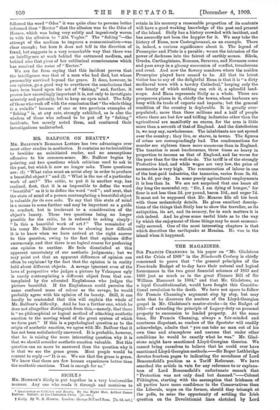SICILY.t
Mn. IltoNRotes Sicily is put together in a very businesslike manner. Any one who reads it through and contrives to • Questionings on Criticism and Beauty. Br the Right Hon. Arthur James Balfour. Oxford : at the Clarendon Press. 12s. net.] t Sicily. By W. S. Monroe. London: George Bell and Sons. [7s. Gd. net.] retain in his memory a reasonable proportion of its contents will have a good working knowledge of the past and present of the island. Sicily has a history crowded with incident, and has assuredly not been the happier for it. We may take the history of Enna, now Castrogiovanni, as an example. There is, indeed, a curious significance about it. The legend of Proserpine and Pluto is a parable ; we see the intrusion of the power of darkness into the fairest of earthly scenes. Sikels, Greeks, Carthaginians, Romans, Saracens, and Normans come and pass away in a gloomy succession of conflict, treacherous and cruel. And now the flowery meadows where the maiden Proserpine played have ceased to be. All that its latest visitor has to say of the delightful Enna is that it is " a dirty mediaeval town with a tawdry Cathedral," keeping only the one beauty of which nothing can rob it, a splendid land- scape. And Enna represents Sicily as a whole. There are prosperous places in it, chiefly the towns, whose harbours are busy with its trade of exports and imports; but the general condition of the country is deplorable. It is greatly over- populated ; more than three millions and a half of people where there are but few and trifling industries other than the agricultural are manifestly an excess, for the area is little more than a seventh of that of England. And the distribution is, we may say, unwholesome. The inhabitants are not spread over the country ; they live, or starve, in towns. The figures of crime are correspondingly bad. The condemnations for murder are eighteen times more numerous than in England. The taxation is most burdensome, three times as heavy in proportion to income as that of England, and far worse for the poor than for the well-to-do. The tariff is of the strongly Protective kind, and while wages are very low, the price of necessaries is very high. The remuneration of labour in one of the best-paid industries, the tanneries, varies from 3s. 6d. to ls. 6d. per day. In some purely agricultural employments it is less than Is. We are not surprised that one hears all day long the mournful cry, " Sir, I am dying of hunger," for flour is not less than 2d. per pound, bacon 10d., and sugar 7d. It must not be supposed that Mr. Monroe fills all his book with these melancholy details. He gives excellent descrip- tions of the things that Sicily has to show the traveller, as its antiquities, its art, and its scenery, for in such matters it is rich indeed. And he gives some useful hints as to the way by which the enjoyment of these things may be most economi- cally secured. One of the most interesting chapters is that which describes the earthquake at Messina. He was in the island when it happened.






































































 Previous page
Previous page